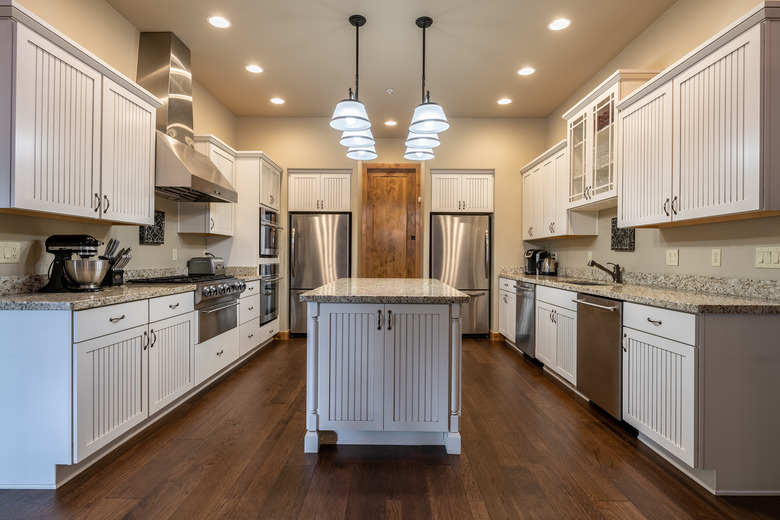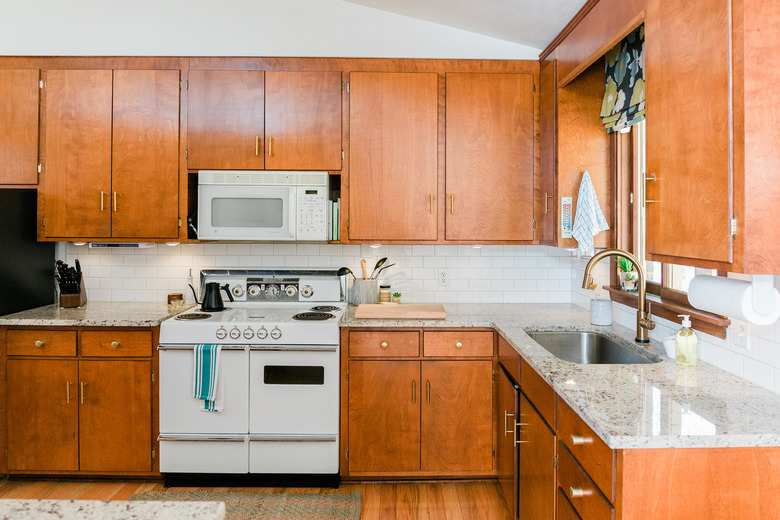Granite Kitchen Countertops: A Homeowner's Comprehensive Guide
For many years now, granite kitchen countertops have pretty much dominated the market in high-end homes. According to the Building Stone Institute, granite countertops are made of a blend of quartz, mica and feldspar with other natural minerals mixed in. The material is mined out of the ground in large slabs, which are then shaped by a fabricator and cut to installation specifications. Granite has enjoyed an enormous amount of popularity, although some new materials are starting to gain a foothold in what has primarily been a natural-stone market for some time.
Pros of Granite Counters
Pros of Granite Counters
There are a variety of different reasons granite countertops rose to popularity, and one of the main ones is the fact that it is a natural material with unique variations, making each piece one of a kind. Those who favor granite sometimes see it as a type of art. The wide spectrum of different colors, random patterns and veining is enormous, making it stand out from other countertop options. Although marble and other natural stones offer some similar perks in terms of appearance, granite has risen to be the go-to choice in residential kitchens for a few key reasons.
Although natural stones vary in hardness, granite tends to be more durable than marble. A hard material that is forged deep in the earth, granite is a type of igneous rock, and this means it is very heat-resistant. The density of granite slabs is high, so it doesn't scratch easily, and it is not subject to getting dents and dings like other types of countertop materials. This sturdiness makes it a good match for the kitchen, a high-traffic area in the home that is subject to a lot of wear and tear on a daily basis.
The strength and durability of granite slabs make these counters extremely long-lasting, which is appealing to homeowners. With minimal care and some basic maintenance, these kitchen counters should last for the life of the house.
Granite comes in at the high end of the budget spectrum, although cost per square foot can vary quite a bit depending on thickness, finish, edging details and the pattern among other factors. Homeowners who select this material tend to view it as more of an investment rather than an expense because granite countertops increase the monetary value of a kitchen space and add to the price of a home overall.
Cons of Granite Counters
Cons of Granite Counters
The same reason some people gravitate toward granite kitchen countertops can actually be one of the negatives as well. Although the slabs have a seemingly infinite number of patterns and a range of different colors, many of these can seem busy or even gaudy to those who prefer a more subtle design palate. This can spell trouble for a homeowner who wants to move, as it could make the kitchen less appealing to this type of buyer down the line. This is especially true if the granite has a more unusual pattern, as tastes do vary.
Another important point that is sometimes overlooked is that granite can stain and fall victim to damage. Staining is more likely with the lighter colors because they tend to be more porous, but it certainly may happen to darker slabs as well. Also, the veining that is considered by many to be attractive can be a weak point that is more likely to crack, and while this material doesn't dent, it can chip if hit with enough force at the right angle.
Within the broad category of granite slabs, styles and colors go in and out of favor just like anything else installed in a home. Since the material itself is heavy and not easy to change, this can be an issue, as well as the fact that it is not a DIY-friendly material. Granite makes for a very cold counter as well, which is something that not everyone prefers. Additionally, the price point is very high when compared to many other materials, ranging anywhere from about $50 to $100 per square foot and sometimes higher. Any or all of these factors can be a significant drawback for homeowners.
Maintaining Granite Countertops
Maintaining Granite Countertops
Day-to-day maintenance for granite countertops is fairly simple. Usually all that is needed is a soft cloth, some warm water and mild dish soap. Simply wipe down the surface, rinse it and then wipe it with a dry, soft cloth. Do not use harsh cleaners on granite, as some substances can etch the surface or dull the finish. Look for products that are made specifically for stone if you want to use something other than mild dish soap.
Many people believe that applying a sealer to this material will totally protect it from absorbing spills, but this isn't exactly true. According to the Natural Stone Institute (NSI), sealing granite doesn't make it impervious to stains; it simply makes the surface more stain-resistant. An "impregnator" type of sealer is the best pick, as it penetrates the pores of the granite, preventing other things from seeping in. The NSI recommends using an oliophobic sealer, which helps repel water and oils. When applied properly, this type of sealer should last for 10 to 15 years.
Other Premium Countertop Materials
Although granite kitchen countertops remain popular, homeowners are increasingly casting the net a bit wider as they select materials for this room of the house, especially at this price point. Although most of the other premium choices will still require a fabricator to accommodate cuts for sinks, faucets and cooktops, homeowners are beginning to look at these other countertops as alternatives to granite.
Man-made quartz countertops in particular are making a big splash, in large part because they are beautiful, sturdy and durable. They are also less apt to stain than granite because they are nonporous.
Stainless steel countertops are being seen more and more often in high-end kitchens, especially those that embrace a more contemporary or modern style. This material is easy to clean and is both heat- and stain-resistant much like granite and quartz, but it does tend to scratch more easily.
Soapstone counters are another natural alternative, and while they are less apt to stain than granite, they can also suffer scratches and dings over time with normal use. Some people don't mind this look and consider the imperfections a part of its appeal. Man-made solid-surface counters are also making more appearances due to the fact that they are a nonporous and extremely low-maintenance material.


